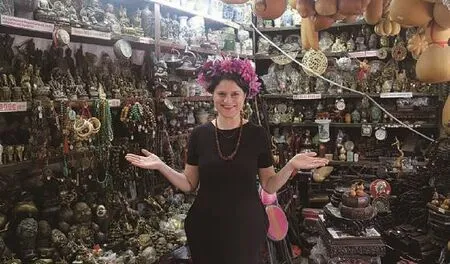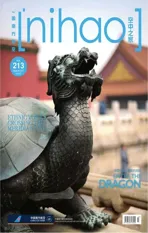DAGA GREGOROWICZ: I’M A GEOGRAPHIC MUSICIAN
2017-04-10
DAGA GREGOROWICZ: I’M A GEOGRAPHIC MUSICIAN
N: How did you, a Pole, form a band with Dana, a Ukrainian?
D: I met Dana during a Jazz training camp in Krakow. She spoke with me in Polish – albeit with an Ukrainian accent. And we found that we enjoyed playing music together. I lived in Poznan, Poland and Dana lived in Lviv, Ukraine, 800 km away. However, it was not easy for us to build a band, not only because Ukrainians need visas to visit Poland but also I was still a Geography student and had to spend most of my time analyzing the trajectory of small satellites. At that time, a jazz musician whom I was really fond of encouraged me to attend more music training camps and finally Dana and I decided to form a band of our own.
N: Were you supposed to have a good job related to your major?
D: Actually I was offered a job with an incredibly high pay on graduation. But I love singing more. I think it must have been fate. Geography, however, broadened my view, and increased my love of nature and the Earth which was a great help for performing folk music. Both geographers and musicians need keen senses to be aware of the beauty on the planet under our feet. Sometimes I feel that I'm a geographic musician. While traveling to other cities I will not only learn about the local life and musical performances there, I will take time to walk out of town. I fully support environmental protection, because city life is not enough for human beings. Without a beautiful environment, humans are not like humans any more. We need to have our life refreshed by music and nature.
N: What do you want to tell people through folk music?
D: Folk music records the history of a nation, but it should not simply repeat it. Folk music is more universal than national in a sense. You can fi nd similar themes in folk music no matter if you're in Ukraine, Syria, India or China. It's interesting that though our ancestors didn't have mobiles phones or other modern communication methods, their understanding of life was closer to heart and easier to strike a chord on the others. I want to reveal such perception of them to the modern world. I want to remind people of our age that we are not the smartest, and not to forget about the wisdom of our forefathers.
N: What do you think about Chinese folk music?
D: Chinese folk music is very hard for westerners to understand. I think it's a completely different expression compared with the western counterpart. But when I visited the countryside in China, I found they actually had things in common. For example, villagers also put their strong feelings for their lovers into their songs. When I studied Ballad of Kang Ding I found its harmony had a unique charm of itself. China is such a vast land with so many ethnic groups and regions that their folk music varies. This is something I didn't know beforehand.
N: How did you begin collaborating with Chinese musicians?
D: We began our collaboration with Ballad of Kang Ding. Every time we performed this song, the Chinese audience reacted strongly. We hope more Chinese could regain their interest in the folk music of their own country. I recently met with the organizer of World Music Shanghai, and through the event I hope to find more Chinese musicians who create world music with national elements. I believe many Chinese youngsters are concerned about the preservation of traditional culture, like Poland and many other countries around the world. This will draw more folk musicians from the world to China.
妲歌:我是地理音乐家

N:你是波兰人,而你的搭档是乌克兰人。两个国家的人,如何走到一起的呢?
D:我跟妲娜在克拉科夫一个爵士乐演唱训练营里相遇,她用乌克兰口音的波兰语跟我聊天,而我跟她的音乐合奏非常愉快。我住在波兰的波茨南,她住在乌克兰的利沃夫,相距只有800公里,不过乌克兰人到波兰需要签证,因此我们走在一起其实并不容易。那个时候我还没有完成自己的音乐训练,还是一个地理学学生,每天还要花很多时间去分析小卫星轨迹,但是一个我很喜欢的爵士乐音乐家鼓励我参加更多的音乐训练营。最终我们决定一起组建乐队。
N:你的专业原本应该让你找到一份很好的工作吧?
D:其实我毕业的时候就拿到了难以想象的高薪工作。但是我更加喜欢唱歌。其实我觉得这是冥冥中注定的东西。不过地理学确实让我的眼界开阔不少,也能够让人更加热爱自然。这对于演唱民歌来说是非常有帮助的。地理学家和音乐家都需要非常敏感的触觉,都要察觉我们脚下地球的美。有时候我会觉得自己就是“地理音乐家”,在旅行的时候不但要考察城市的生活和音乐演出,还要到城市周边的郊外去走走。我一直认为环境保护是值得提倡的,因为只有城市的生活不算完整的生活;没有大自然和美好的自然环境,人类就不再成为人类了。人们的生活要在自然和音乐的美中得到舒缓。
N:你们希望通过民歌告诉人们什么?
D:民歌记录了民族的民间历史,但不应该机械地重复历史。民歌除了民族性之外,更加有普世性,无论在波兰还是在乌克兰、叙利亚、印度还是中国,你都可以在民间音乐中找到非常相似的题材。这就是我们想展示的——即使我们的祖先没有手机和其他现代通信设备,他们对生活的感知却十分贴近真实,并能引起共鸣,我们希望把这种感知和认识都重新展现给世人。我们想提醒当代人,不要总是觉得自己非常聪明,却忘记了祖先的智慧。
N:你对中国民歌有什么感觉?
D:中国民歌刚听起来非常困难,一些外国人无法理解中国民歌的艺术语言,可以说它跟西方音乐是两套截然不同的表达系统。但是当我在中国农村城郊走访和踩点,我还是觉得有很多共同点的。比如说,生活在山村中的人们也有着丰富的感情生活,并且把它唱出来。当我们仔细研究《康定情歌》的时候,我们发现这首歌的和声有一种独特的美。当然,中国地大物博有那么多个民族和区域,不同地区和民族的民间音乐也有所不同,这个我们以前还是不知道的。
N:你是什么时候开始跟中国音乐家合作的呢?
D:我们首次展开合作就是这首《康定情歌》。我发现每次我们演唱这首歌的时候,中国观众的反应都很强烈,我们希望更多的中国观众对自己国家的民歌产生共鸣。我最近遇到了上海世界音乐季的主办方,希望能够在中国认识更多通过民族元素来创作世界音乐的人们。我相信跟波兰和世界上很多国家一样,很多中国年轻人也非常关心自己传统文化的保存,这将吸引更多国外的民间音乐家来中国交流和演出。
